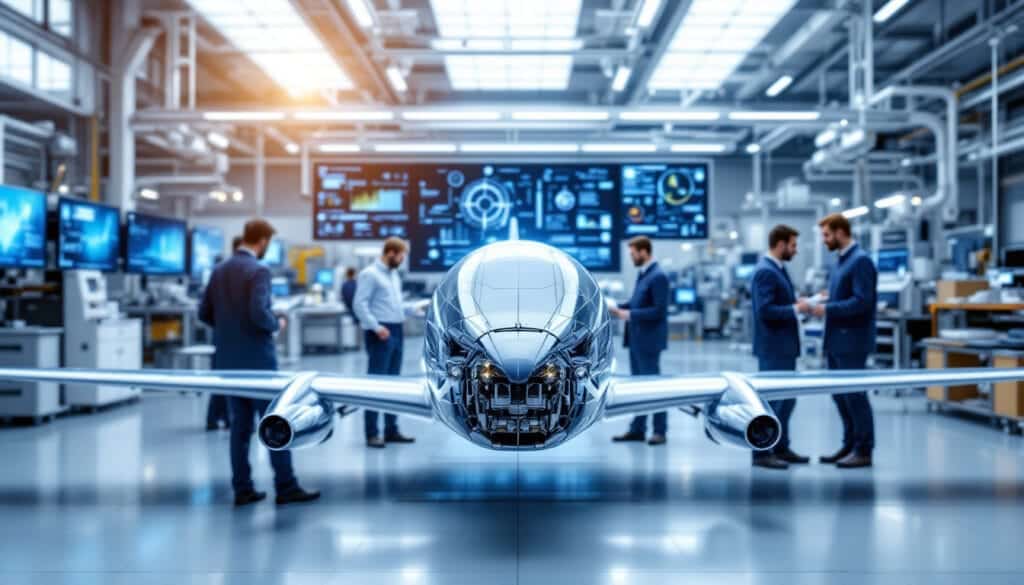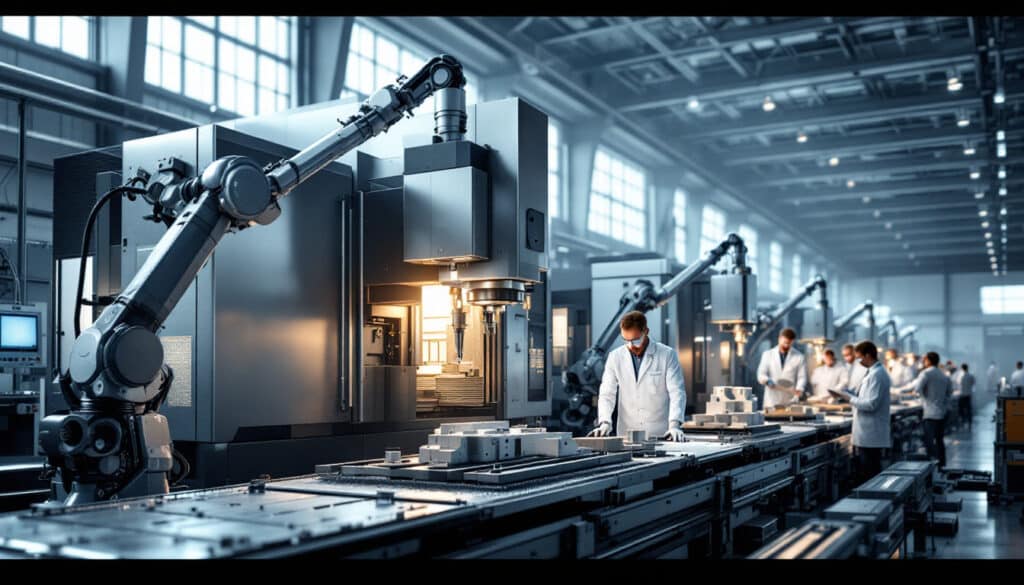Table des matières
ToggleThe impact of Industry 4.0
Industry 4.0 is revolutionizing the aerospace sector by integrating advanced digital technologies and smart sensors throughout the production chain. Companies are adopting cyber-physical systems and using real-time data to improve the efficiency and accuracy of processes.
3D printers play a crucial role in the manufacture of complex parts, allowing for rapid customization and a reduction in production costs. Moreover, robotics and automated objects automate repetitive tasks and gather essential data for continuous optimization.
Digital twins are also a key component of Industry 4.0. These virtual replicas of physical components allow for advanced simulations and predictive analyses, thereby reducing the risk of error and downtime. With these technologies, predictive maintenance becomes possible, increasing the lifespan of equipment.
By utilizing data analytics, aerospace companies can not only monitor performance in real-time but also anticipate potential issues and optimize operations. This proactive approach is essential to maintain high competitiveness in the global market.
Artificial intelligence (AI) and machine learning enable the refinement of production processes by providing insights based on collected data. This leads to better decision-making and optimal resource alignment.
The benefits of Industry 4.0 in aerospace include:
- Increased productivity
- Reduction of production costs
- Improvement in product quality
- Predictive maintenance
- Resource optimization
Finally, the adoption of these technologies fosters innovation and enables aerospace companies to stay at the forefront of technological advancements. Digital transformation is thus imperative to ensure sustainable growth and increased competitiveness in this constantly evolving sector.
Optimization of production processes
Industry 4.0 is revolutionizing the aerospace sector by integrating advanced technologies that optimize production processes. With IoT, artificial intelligence, and robotics, aerospace companies are becoming more efficient and competitive.
The technologies of Industry 4.0 have a significant impact on data management. Connected sensors enable the collection and analysis of real-time data, thus facilitating informed decision-making. Machine learning algorithms process this data to anticipate failures and reduce downtimes.
The automation of repetitive tasks through robotics increases productivity. Collaborative robots, or cobots, work alongside human operators, thereby enhancing the accuracy and speed of assembly operations. This human-machine collaboration also improves safety on production lines.
- 3D Printing: Reduces the manufacturing time of critical parts and allows for more complex designs.
- Digital Simulation: Predictive and rapidly adaptable, optimizing processes before their physical implementation.
- Cost Reduction: Achieved through resource optimization and decreased waste.
Industry 4.0 also promotes predictive maintenance, essential in the aerospace sector. By continuously monitoring equipment status, it is possible to schedule maintenance interventions before failures occur, thus ensuring maximum machine availability.
Finally, augmented reality (AR) platforms enhance the training of technicians and engineers. Assembly and maintenance instructions projected into the operators’ field of vision facilitate the precise and rapid execution of complex tasks. This technology reduces errors and improves the quality of finished products.
Development of innovative solutions
Industry 4.0 is transforming several sectors, including the aerospace sector. Thanks to advanced digital technologies, production processes are now more efficient, precise, and cost-effective.
Industry 4.0 has a significant impact on the aerospace sector. Companies can now utilize technologies such as the Internet of Things (IoT), Artificial Intelligence (AI), and big data to improve their industrial processes.
- Improvement of production quality due to increased automation.
- Reduction of downtimes through predictive maintenance.
- Increase in productivity through workflow optimization.
Industry players are continuously developing innovative solutions to remain competitive. The integration of new tools and technologies is essential. Examples include the use of additive manufacturing to produce complex and lightweight parts, and the application of augmented reality for technician training and maintenance.
In summary, the adoption of Industry 4.0 in the aerospace sector offers considerable opportunities to optimize production processes and stay at the forefront of technological innovation.





